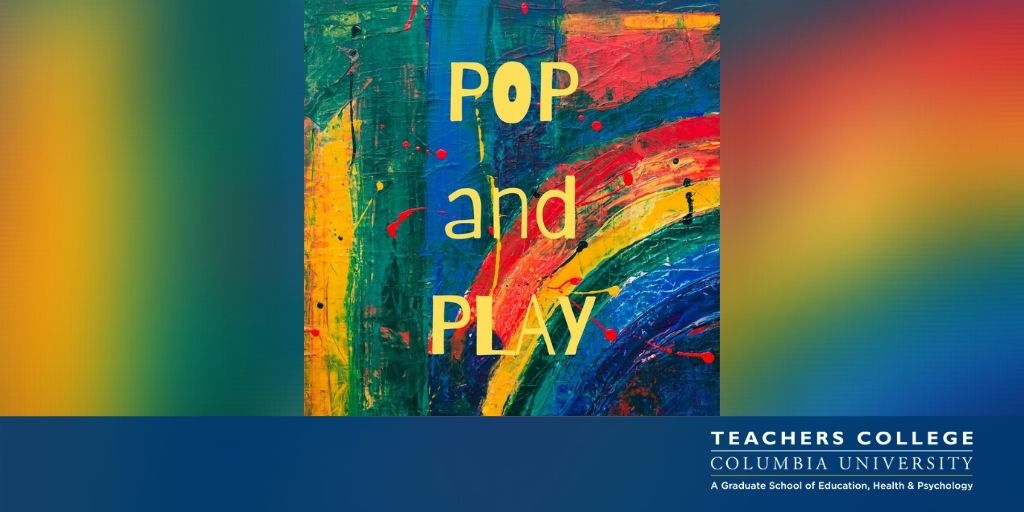Throughout the MST Department, faculty members have been working on a number of podcasting projects this year. Spanning everything from media literacy education to pop culture and play, the topics our professors engage with are varied and many. Below, you can learn about three podcasts MST faculty are involved in:
Professor Nathan Holbert is the Co-Host of Pop and Play
Pop and Play, a project of TC’s Digital Futures Institute, is a podcast about pop culture and play. It features CMLTD Program Assistant Professor Nathan Holbert and Curriculum & Teaching Assistant Professor Haeny Yoon as hosts, where they have “conversations with scholars, artists, designers, parents and kids about how and why they play” (from the Pop and Play trailer, which you can learn more about here). The podcast features guests such as Provost John Jackson of the University of Pennsylvania, TC Professor Yolanda Sealy-Ruiz and Daughter Olivia Ruiz, Lil Miss Hot Mess of Drag Queen Story Hour, and Stanford Professor Antero Garcia, among many others. The podcast has discussed topics such as multimodal scholarship as play, speculative fiction and the political dimensions of play within the genre, and youth play in virtual worlds. One of the highlights of the show is a segment called “What’s Poppin’?” where the hosts ask guests about their favorite pop culture phenomenon of the week. It’s a fun and engaging podcast that's definitely worth a listen.
You can listen to Pop and Play on Apple Podcasts, Spotify, Google Podcasts.
Professor Lalitha Vasudevan is Co-Producer of the (Re)Search for Solutions Limited Series
(Re)Search for Solutions is a which covers research about pressing issues in our world today. Season 1 of the podcast is a limited series focusing specifically on unexpected and creative ways that researchers are looking at solutions to the persistence of gun violence. The series is co-produced by CMLTD Professor and Vice Dean for Digital Innovation Lalitha Vasudevan, alongside Associate Professor of Health Education Sonali Rajan, CMLTD Alum and UPenn doctoral student Azsaneé Truss, and Dr. Joe Riina-Ferrie of the Digital Futures Institute. To develop these stories, their team collaborates with the experts (professors, community members, doctors, activists, teachers, and more) to understand the stories surrounding their work. The series has explored topics such as "greening" —the conversion of an overgrown vacant lot to a small, grass-covered community space— as a non-policy-based solution to gun violence and the experiences of clinicians who deal with the immediate aftermath of a shooting.
You can subscribe to (Re)Search for Solutions on Apple Podcasts, Spotify, and Google Podcasts.
Professor Felicia Mensah Featured on the What are YOU going to do with THAT? Podcast
Episode 50 of the What are YOU going to do with THAT? podcast features Department Chair and Science Education Professor Felicia Mensah. Dr. Mensah is a co-editor of the top-tier peer review "Journal of Research in Science Teaching", and the author of the book Like Words Falling onto the Page. She has an exceptional record advising doctoral students and developing early career scholars and enjoys teaching and serving as a mentor. On this special episode of the What are YOU going to do with THAT? podcast, Dr. Mensah shares with her tips and advice about better academic writing, and answers many questions from the point of view of both an editor and a supervisor.
Professor Chris Emdin Featured on the MasterMine Podcast
A recent episode of the MasterMine podcast, titled “Revolutionizing Education,” features Science Education Professor Chris Emdin. Professor Emdin is the author of several very successful books including Urban Science Education for the Hip-Hop Generation (2010), For White Folks Who Teach in the Hood …and the Rest of Y’all Too (2016), and Ratchetdemic (2021). He is renowned for his work on #HipHopEd, and is also Scholar/Griot in Residence at Lincoln Center for the Performing Arts. On this episode of MasterMine, Professor Emdin shares insights about teaching in K-12 settings based on his decades-long career as both a K-12 teacher and a professor educating future teachers. He also reflects on what it would mean to create schools that pursue liberation.
